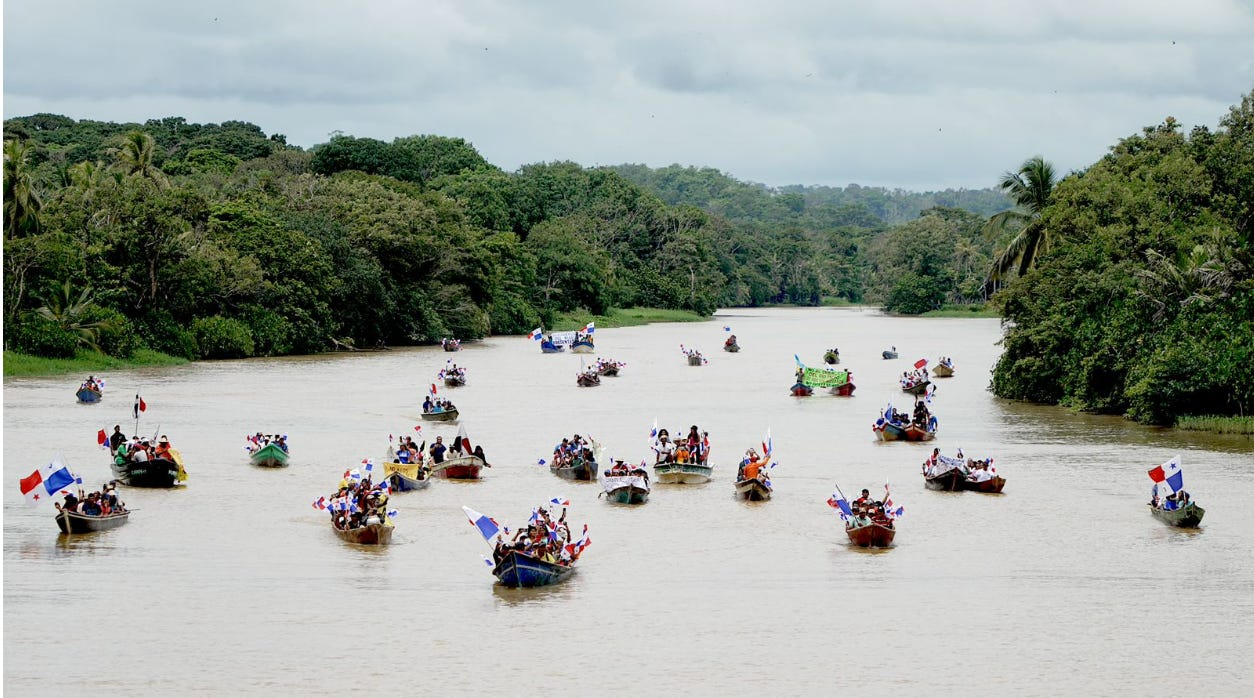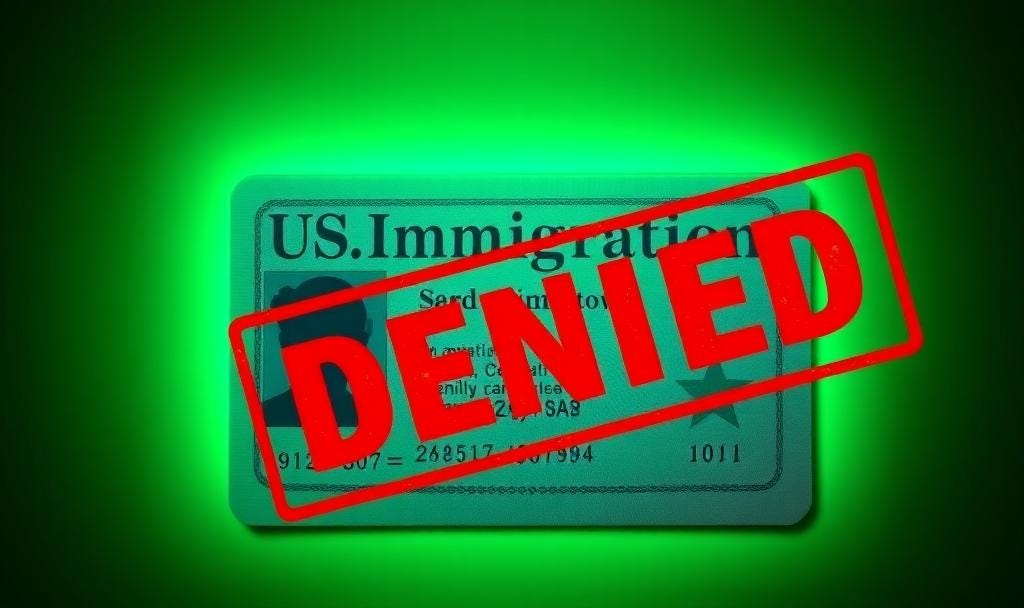US Visas: Rabiblanco Kryptonite
The vulnerability of Panama's elites affects the country's negotiating position
On 22 April Colombian president Gustavo Petro nonchalantly announced during his televised cabinet meeting that his US visa had been cancelled. He didn’t appear too worried. “I’ve seen Donald Duck several times,” he added mischievously. Last week he signed up his country to China’s Belt & Road Initiative.
The episode put me in mind of a very different experience I had at the beginning of April when I lunched with Juan Carlos Varela. I wanted to discuss the ex-president’s 2017 decision to switch Panama’s diplomatic relations from Taipei to Beijing. He, on the other hand, wanted to emphasize that the US Department of Justice had no evidence of the “significant corruption” they attributed to him and to impress on me how much the revocation of his US visa had damaged him and his family. He had since been through a messy divorce, he hadn’t seen his adult children (both in the US) for several years, and his new girlfriend didn’t want to be seen in public with him.
There are two points here. The first, as new US ambassador Kevin Marino Cabrera reminded Panamanians in his first week on the job, is that a US visa “is a privilege not a right.” They can be revoked with the click of a mouse and don’t require lengthy trials or a burden of proof.
The second is that Panama’s political and business elite, the rabiblancos, are the most vulnerable in Latin America. For Petro the loss of his visa is a badge of honor for the self-styled “last Aureliano” of Latin American imperialism. Venezuela’s boligarchs have long defied all manner of US sanctions to maintain a cushy lifestyle in Caracas. In Panama, however, no one gets truly wealthy without doing business with US banks and companies. Just about every senior politician and their offspring study in the US. The loss of a visa doesn’t just create travel and business headaches, it also inflicts pariah status at the Club Unión.
Orphaned protests
I believe the effect of this threat can be seen in the opposition’s response to the protests. On 30 April several major opposition figures signed a “joint statement of national sovereignty” but they have yet to join the masses in the streets. As I wrote in my analysis for Americas’ Quarterly, there are good reasons not to. But in the days after this declaration, the US embassy called up its signatories. “They weren’t happy” according to Ricardo Lombana, who has yet to be seen on Avenida Balboa waving the national flag as he did in November 2023.
The years of the dragon
The US visa threat also affects the government. Between 2017 and 2019 Chinese investment was the only game in town for entrepreneurial rabiblancos. Over 40 bilateral agreements were signed between the countries. Chinese companies hired local bankers, lawyers and consultants. Not every deal, I think it’s safe to say, was 100% transparent and above board.
Trump’s toddler-talk about the Panama Canal (“we built it, it’s unfair, it’s mine”) should not distract from the fact that at various US Senate hearings this year some serious people with deep Panama knowledge have highlighted “the reputation the Government of Panama has for corruption and susceptibility to foreign influence.”
Does China operate the Panama Canal? No.
Has China gained a great deal of influence and leverage over the country’s political and business elites? Yes.
Back in 2020 I wrote that US back-channel pressure in the form of visa cancellations, OFAC list inclusion, and uncomfortable interrogations at US airports, had made it clear to Panamanian politicians that Chinese incursions had to be curtailed. Major infrastructure projects, financial deals and a free trade agreement were subsequently cancelled or put on ice.
La Prensa has a handy rundown of prominent Panamanians who have seen their visa rescinded and there are unconfirmed rumors (the State Department doesn’t comment on visa issues) of further cancellations in February. Ambassador Marino was just making the threat explicit.
Why does it matter now?
Mulino is not a typical rabiblanco. But if we accept - as just about every regular Panamanian does - that real power is held not by the politicians but by a dozen mega-wealthy families, it seems fair to ask to what extent rabiblanco fear of US sanctions is influencing the government’s current diplomatic strategy.
For example, Anel “Bolo” Flores, the comptroller general in charge of auditing Panama Ports Company, produced a report that deemed the Hong Kong firm to be in breach of its contract and criticized the government of Mireya Moscoso. But, as my aggrieved sources in the logistics center pointed out to me, it stopped short of digging up evidence of corruption that could embarrass too many businessmen.
So far, the Mulino government has given a number of major concessions to the US. In return, the US appears to be gearing-up for its private sector to return to Panama in a big way. That would suit those with the power and pockets to benefit. And it certainly looks better than the alternative: Resistance, visa cancellations and a Varela-like purgatory.
OTHER NEWS
🍾 Bottle Update: Two weeks ago I confessed my ignorance of the origin of the term “botella”. Rum-soaked amateur etymologist JF wrote in:
“It comes from the time of the American colonial presence in the Spanish speaking Greater Antilles at the turn of the last century. US soldiers brought in Coca Cola in wooden boxes, known as "guacales." They recycled the empty bottles and they just sat there, outside the officers' clubs, in the boxes, empty, until the next shipment came through. It became a term for sinecure.”
⚓ Free Trade Zone: Ambassador Cabrera made his first visit to Colon, including a stop at the Free Trade Zone, home to Huawei’s LatAm distribution center and all sorts of dodgy dealings. I expect this will be the next target of US scrutiny.
🛬 Plane Crash: An Air Panama flight with 38 people on board crashed on landing a Bocas del Toro airport on Friday. No one was seriously injured.
🐒Monkey Business: The wave of lawlessness continues. Panamanian capuchins have begun kidnapping baby howler monkeys.






Thanks David! Do you have any memories of Panama as a child?
Thanks for your always insightful posts. I was born in Panama after WW2 as my father was serving in the navy. We have visited once for a canal transit so I am always interested in what’s happening.